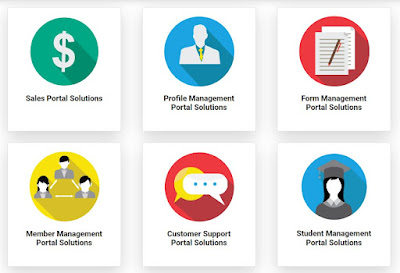Top Portal Types
Businesses, schools, governments and nonprofits use web portals in many ways. The Portal Connector has identified 6 of the most popular scenarios that require web portals:
- Sales. Customer portals can make it easier to add new products and conduct sales activities with fewer communications. They offer 24x7 access even when this would not be practical for sales staff. Consider how self-service has changed home and car buying and ask yourself whether your business would benefit from similar sales portal capability.
- Profile management. Errors in customer data are expensive, so allowing self-service profile updates can improve the quality of your data along with better customer service.
- Form management. Portals can replace email for completing electronic forms. The data from the forms can flow straight to the database or customer relationship management system (CRM) where it needs to be. Forms with online help and validation also result in better quality data than unstructured documents, templates or spreadsheets.
- Member management. Membership organizations need the same capabilities as commercial businesses, only for their members rather than customers. A membership portal facilitates new memberships and renewals, makes membership benefits easier to consume, and tracks activities of members on the portal so you can improve member engagement.
- Customer support. As with sales, customers now expect to have online support available at all times. Just as many people now prefer an automated teller machine to going into a bank to make a deposit or withdrawal, consumers expect to be able to solve their own issues through online support. For many businesses, this means not only a knowledge base but also online chat or even an automated chatbot to guide the customer to a support solution.
- Student management. It's not just customers who need portals. With remote and hybrid learning students need web portals to access educational materials, schedule and take tests, pay fees, and other activities/
All these portal solutions provide benefits such as increased operational efficiency. Customers and other stakeholders now expect self-service capability which is offered by portals.
If you already have a database or CRM which hosts the data your portal users will need you are more than halfway to providing a compelling portal user experience.
